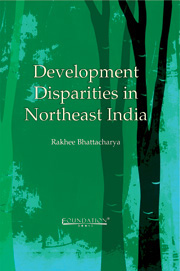Book contents
- Frontmatter
- Contents
- Preface
- List of Figures
- List of Tables
- 1 Challenges of Disparity in the Northeast
- 2 Dimensions of Disparity in the Northeast
- 3 Facets of Government Finance in the Northeast
- 4 Economy of Insurgency in the Northeast
- 5 Energy Interplay in the Northeast
- 6 Development Initiatives in the Northeast
- Index
6 - Development Initiatives in the Northeast
Published online by Cambridge University Press: 05 June 2012
- Frontmatter
- Contents
- Preface
- List of Figures
- List of Tables
- 1 Challenges of Disparity in the Northeast
- 2 Dimensions of Disparity in the Northeast
- 3 Facets of Government Finance in the Northeast
- 4 Economy of Insurgency in the Northeast
- 5 Energy Interplay in the Northeast
- 6 Development Initiatives in the Northeast
- Index
Summary
Strategy for Northeast India: Post Independence Scenario
With the adoption of Five Year planning in post-Independence India, a new era set in to develop the ‘weaker sections’ of the people of the country by emphasizing education, community development and tribal upliftment. This became forceful in 1957 with Nehru's ground-breaking idea of panchsheel, where he spoke about tribal protection encompassing ethno-cultural preservation, land rights, equality and freedom. Ever since, the Indian government has been trying to bring the marginalized sections of society into the mainstream by initiating various tribal development plans and programmes, and also through its ‘reservations’ policy, which marks steps towards ‘positive discriminations’. Through such positive discrimination, certain number of places are reserved for scheduled tribes in public services and in higher education. Governments at both the state and the central levels in India have special Tribal Sub Plan programmes which inject substantial financial resources into tribal upliftment. In this regard, in Northeast India, Government policies were oriented towards the preservation of its rich ethno-cultural identity while introducing modern economic mechanisms for development.
‘Special provisions were made under the Sixth Schedule to the Constitution for the administration of the tribal areas. The scheme of the administration was almost wholly based on the North East Frontier Tribal and Excluded Areas Sub-Committee of the Constitution Assembly. The scheme conceived an autonomous administration in these areas so that the tribal people may continue to follow their traditional way of life with such changes as they themselves may like to introduce’.
- Type
- Chapter
- Information
- Development Disparities in Northeast India , pp. 148 - 169Publisher: Foundation BooksPrint publication year: 2011

